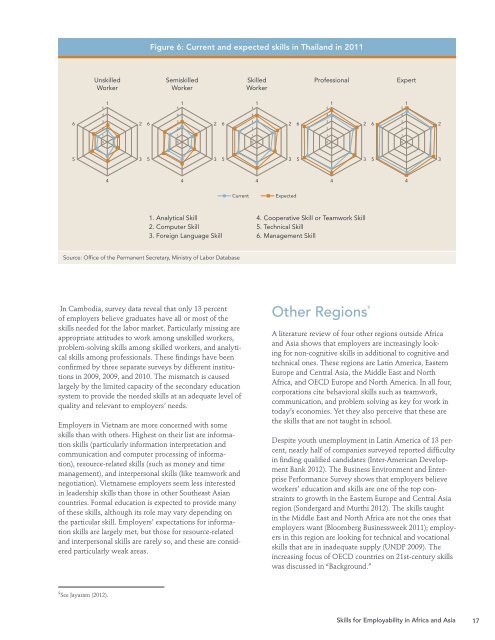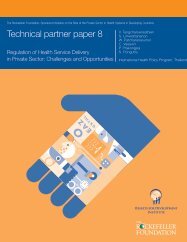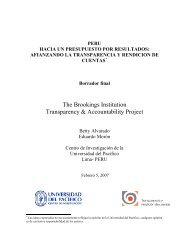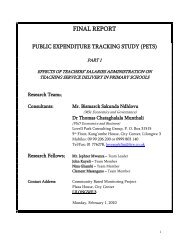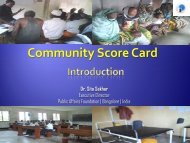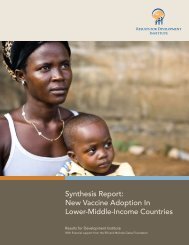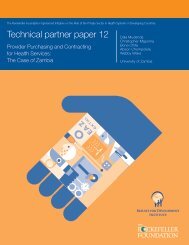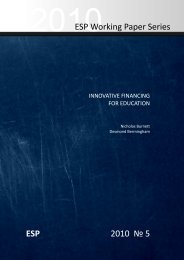Innovative Secondary Education For Skills Enhancement
Innovative Secondary Education For Skills Enhancement
Innovative Secondary Education For Skills Enhancement
Create successful ePaper yourself
Turn your PDF publications into a flip-book with our unique Google optimized e-Paper software.
Figure 6: Current and expected skills in Thailand in 2011<br />
Unskilled<br />
Worker<br />
Semiskilled<br />
Worker<br />
Skilled<br />
Worker<br />
Professional<br />
Expert<br />
1<br />
5<br />
1<br />
5<br />
1<br />
5<br />
1<br />
5<br />
1<br />
5<br />
4<br />
4<br />
4<br />
4<br />
4<br />
6<br />
3<br />
2<br />
2<br />
6<br />
3<br />
2<br />
2<br />
6<br />
3<br />
2<br />
2<br />
6<br />
3<br />
2<br />
2<br />
6<br />
3<br />
2<br />
2<br />
1<br />
1<br />
1<br />
1<br />
1<br />
0<br />
0<br />
0<br />
0<br />
0<br />
5<br />
3<br />
5<br />
3<br />
5<br />
3<br />
5<br />
3<br />
5<br />
3<br />
4<br />
4<br />
4<br />
4<br />
4<br />
Current<br />
Expected<br />
1. Analytical Skill<br />
2. Computer Skill<br />
3. <strong>For</strong>eign Language Skill<br />
4. Cooperative Skill or Teamwork Skill<br />
5. Technical Skill<br />
6. Management Skill<br />
Source: Office of the Permanent Secretary, Ministry of Labor Database<br />
In Cambodia, survey data reveal that only 13 percent<br />
of employers believe graduates have all or most of the<br />
skills needed for the labor market. Particularly missing are<br />
appropriate attitudes to work among unskilled workers,<br />
problem-solving skills among skilled workers, and analytical<br />
skills among professionals. These findings have been<br />
confirmed by three separate surveys by different institutions<br />
in 2009, 2009, and 2010. The mismatch is caused<br />
largely by the limited capacity of the secondary education<br />
system to provide the needed skills at an adequate level of<br />
quality and relevant to employers’ needs.<br />
Employers in Vietnam are more concerned with some<br />
skills than with others. Highest on their list are information<br />
skills (particularly information interpretation and<br />
communication and computer processing of information),<br />
resource-related skills (such as money and time<br />
management), and interpersonal skills (like teamwork and<br />
negotiation). Vietnamese employers seem less interested<br />
in leadership skills than those in other Southeast Asian<br />
countries. <strong>For</strong>mal education is expected to provide many<br />
of these skills, although its role may vary depending on<br />
the particular skill. Employers’ expectations for information<br />
skills are largely met, but those for resource-related<br />
and interpersonal skills are rarely so, and these are considered<br />
particularly weak areas.<br />
Other Regions 9<br />
A literature review of four other regions outside Africa<br />
and Asia shows that employers are increasingly looking<br />
for non-cognitive skills in additional to cognitive and<br />
technical ones. These regions are Latin America, Eastern<br />
Europe and Central Asia, the Middle East and North<br />
Africa, and OECD Europe and North America. In all four,<br />
corporations cite behavioral skills such as teamwork,<br />
communication, and problem solving as key for work in<br />
today’s economies. Yet they also perceive that these are<br />
the skills that are not taught in school.<br />
Despite youth unemployment in Latin America of 13 percent,<br />
nearly half of companies surveyed reported difficulty<br />
in finding qualified candidates (Inter-American Development<br />
Bank 2012). The Business Environment and Enterprise<br />
Performance Survey shows that employers believe<br />
workers’ education and skills are one of the top constraints<br />
to growth in the Eastern Europe and Central Asia<br />
region (Sondergard and Murthi 2012). The skills taught<br />
in the Middle East and North Africa are not the ones that<br />
employers want (Bloomberg Businessweek 2011); employers<br />
in this region are looking for technical and vocational<br />
skills that are in inadequate supply (UNDP 2009). The<br />
increasing focus of OECD countries on 21st-century skills<br />
was discussed in “Background.”<br />
9 See Jayaram (2012).<br />
<strong>Skills</strong> for Employability in Africa and Asia 17


